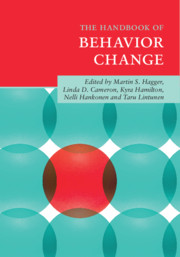Book contents
- The Handbook of Behavior Change
- The Handbook of Behavior Change
- Copyright page
- Dedication
- Contents
- Figures
- Tables
- Sidebars
- Contributors
- 1 Changing Behavior: A Theory- and Evidence-Based Approach
- Part I Theory and Behavior Change
- Part II Methods and Processes of Behavior Change: Intervention Development, Application, and Translation
- Part III Behavior Change Interventions: Practical Guides to Behavior Change
- 31 Attitudes and Persuasive Communication Interventions
- 32 Self-Efficacy Interventions
- 33 Imagery, Visualization, and Mental Simulation Interventions
- 34 Affect-Based Interventions
- 35 Autonomy-Supportive Interventions
- 36 Incentive-Based Interventions
- 37 Monitoring Interventions
- 38 Goal Setting Interventions
- 39 Planning and Implementation Intention Interventions
- 40 Self-Control Interventions
- 41 Habit Interventions
- 42 Economic and Behavioral Economic Approaches to Behavior Change
- 43 Dyadic Behavior Change Interventions
- 44 Social Identity Interventions
- 45 Motivational Interviewing Interventions
- 46 The Science of Behavior Change: The Road Ahead
- Index
- References
46 - The Science of Behavior Change: The Road Ahead
from Part III - Behavior Change Interventions: Practical Guides to Behavior Change
Published online by Cambridge University Press: 04 July 2020
- The Handbook of Behavior Change
- The Handbook of Behavior Change
- Copyright page
- Dedication
- Contents
- Figures
- Tables
- Sidebars
- Contributors
- 1 Changing Behavior: A Theory- and Evidence-Based Approach
- Part I Theory and Behavior Change
- Part II Methods and Processes of Behavior Change: Intervention Development, Application, and Translation
- Part III Behavior Change Interventions: Practical Guides to Behavior Change
- 31 Attitudes and Persuasive Communication Interventions
- 32 Self-Efficacy Interventions
- 33 Imagery, Visualization, and Mental Simulation Interventions
- 34 Affect-Based Interventions
- 35 Autonomy-Supportive Interventions
- 36 Incentive-Based Interventions
- 37 Monitoring Interventions
- 38 Goal Setting Interventions
- 39 Planning and Implementation Intention Interventions
- 40 Self-Control Interventions
- 41 Habit Interventions
- 42 Economic and Behavioral Economic Approaches to Behavior Change
- 43 Dyadic Behavior Change Interventions
- 44 Social Identity Interventions
- 45 Motivational Interviewing Interventions
- 46 The Science of Behavior Change: The Road Ahead
- Index
- References
Summary
The Handbook of Behavior Change is the first wide-ranging compendium of theory- and evidence-based research and practice on behavior change. It provides scientists, students, and practitioners with the current evidence on behavior change and expert advice on how to develop, evaluate, and implement behavior change interventions. The handbook also sets an agenda for future research on behavior change theory and practice across multiple behaviors, contexts, and populations. This chapter outlines emerging issues and future research directions arising from the handbook. The chapter stresses the importance of theory development, including the need for greater emphasis on ecological and social theories; clearer descriptions and operationalizations of behavior change theories; and increased application of interdisciplinary approaches. Future research on intervention development should conduct more comprehensive intervention fidelity assessments; adopt novel means to improve the translation, feasibility, and optimization of interventions; ensure consideration of ethical issues in behavior change research; routinely evaluate mechanisms of action in behavior change interventions; and apply complex systems approaches to behavior change. “Best-practice” guidance on behavior change should consider emerging methods and approaches to behavior change; implement trials to evaluate the long-term maintenance of behavior change; and develop core curricula on behavior change to educate the next generation of scientists and practitioners.
Keywords
Information
- Type
- Chapter
- Information
- The Handbook of Behavior Change , pp. 677 - 699Publisher: Cambridge University PressPrint publication year: 2020
